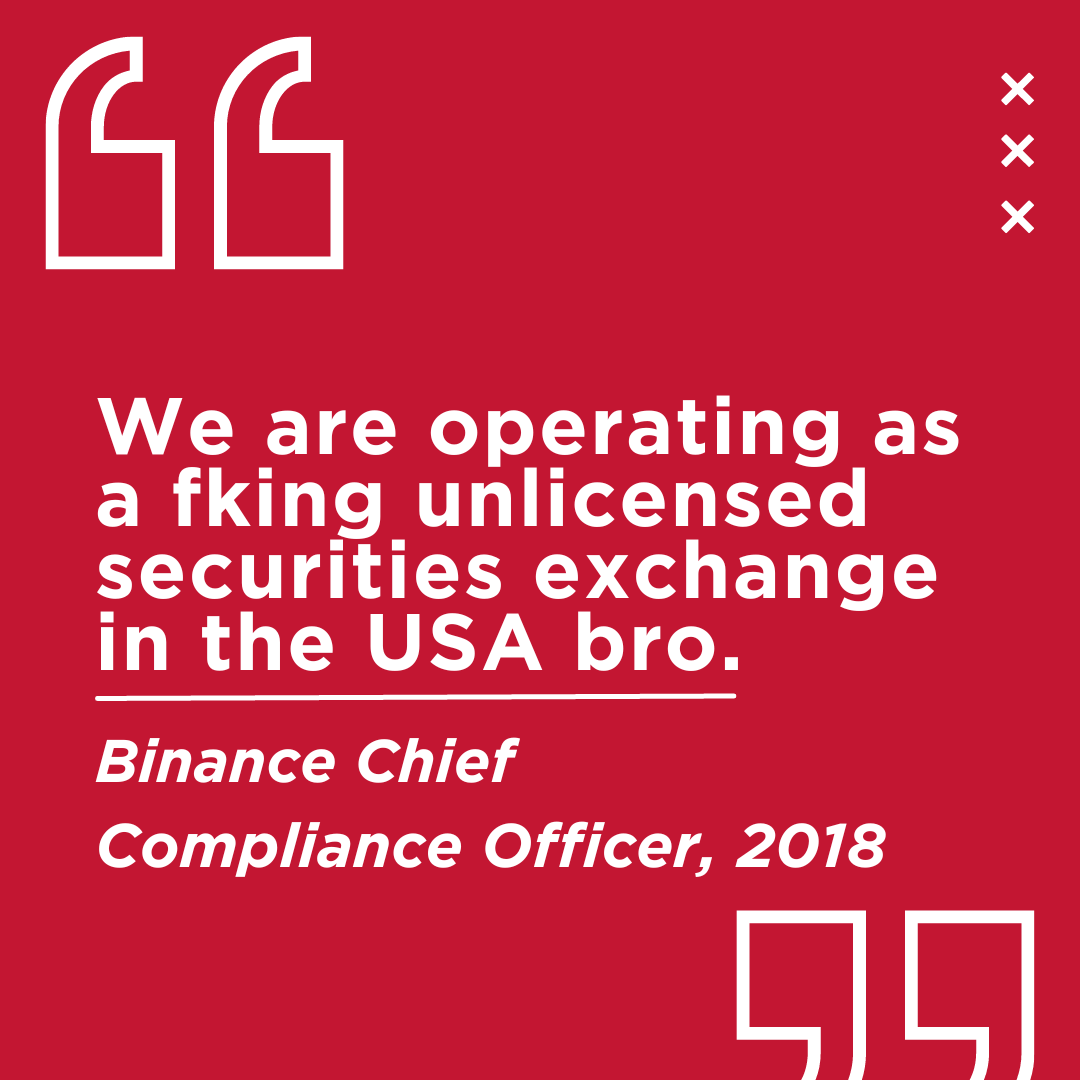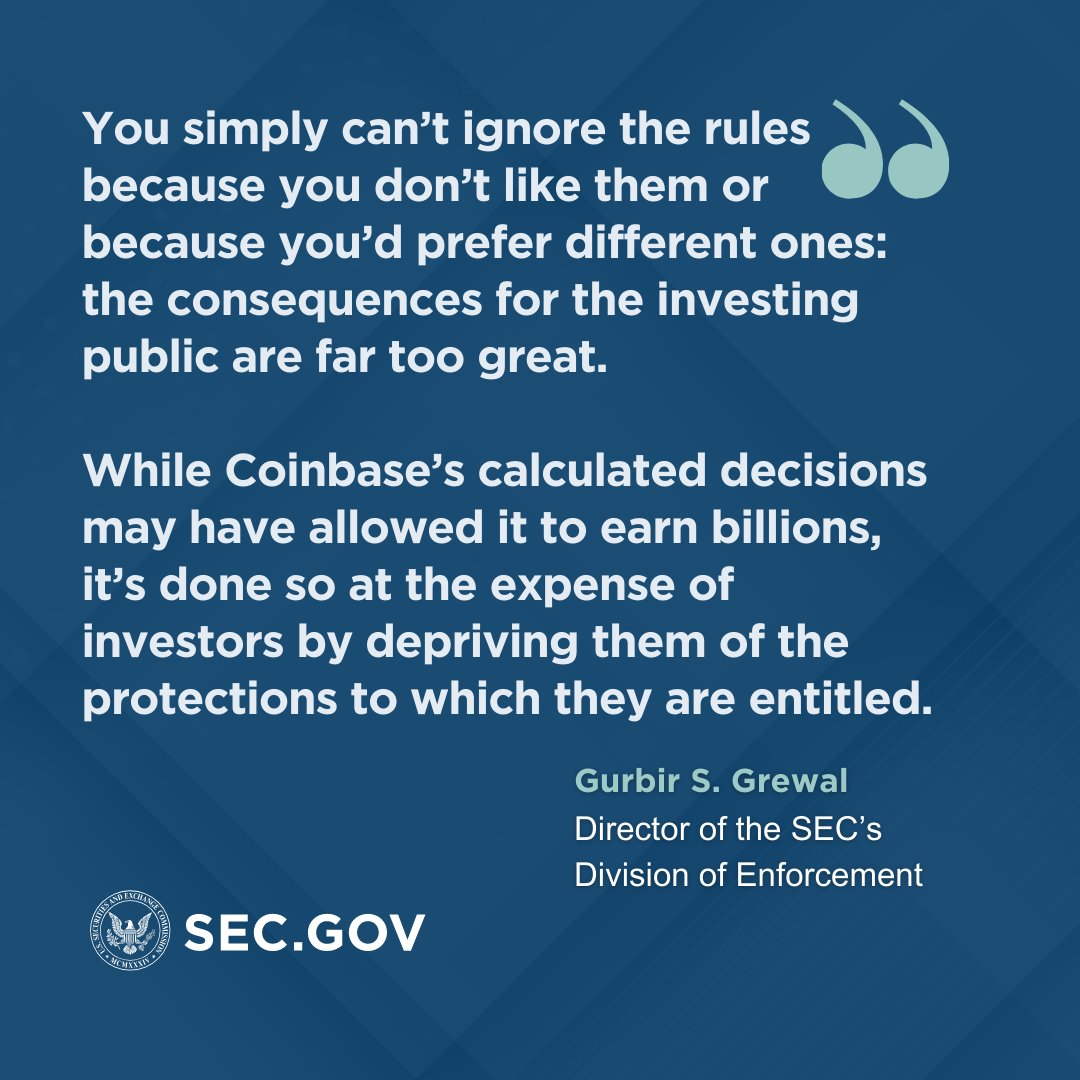Custodial Risk in June 2023

Binance

- The Securities and Exchange Commission today [6/5/2023] charged Binance Holdings Ltd. (“Binance”), which operates the largest crypto asset trading platform in the world, Binance.com; U.S.-based affiliate, BAM Trading Services Inc. (“BAM Trading”), which, together with Binance, operates the crypto asset trading platform, Binance.US; and their founder, Changpeng Zhao, with a variety of securities law violations.
- Among other things, the SEC alleges that, while Zhao and Binance publicly claimed that U.S. customers were restricted from transacting on Binance.com, Zhao and Binance in reality subverted their own controls to secretly allow high-value U.S. customers to continue trading on the Binance.com platform.
- Further, the SEC alleges that, while Zhao and Binance publicly claimed that Binance.US was created as a separate, independent trading platform for U.S. investors, Zhao and Binance secretly controlled the Binance.US platform’s operations behind the scenes.
- “Through thirteen charges, we allege that Zhao and Binance entities engaged in an extensive web of deception, conflicts of interest, lack of disclosure, and calculated evasion of the law,” said SEC Chair Gary Gensler. “As alleged, Zhao and Binance misled investors about their risk controls and corrupted trading volumes while actively concealing who was operating the platform, the manipulative trading of its affiliated market maker, and even where and with whom investor funds and crypto assets were custodied. They attempted to evade U.S. securities laws by announcing sham controls that they disregarded behind the scenes so that they could keep high-value U.S. customers on their platforms. The public should beware of investing any of their hard-earned assets with or on these unlawful platforms.”
- “We allege that Zhao and the Binance entities not only knew the rules of the road, but they also consciously chose to evade them and put their customers and investors at risk – all in an effort to maximize their own profits,” said Gurbir S. Grewal, Director of the SEC’s Division of Enforcement. “By engaging in multiple unregistered offerings and also failing to register while at the same time combining the functions of exchanges, brokers, dealers, and clearing agencies, the Binance platforms under Zhao’s control imposed outsized risks and conflicts of interest on investors. Those risks and conflicts are only heightened by the Binance platforms’ lack of transparency, reliance on related-party transactions, and lies about controls to prevent manipulative trading. Despite their years-long efforts to not ‘be held accountable,’ today’s complaint begins the process of doing so.”
- The SEC’s complaint alleges that (1) with respect to Binance.com, Binance should have registered as an exchange, broker-dealer, and clearing agency; (2) with respect to Binance.US, Binance and BAM Trading should have registered as an exchange and as clearing agencies; and (3) BAM Trading should have registered as a broker-dealer.
- The SEC charged Binance for the unregistered offers and sales of BNB, BUSD, and crypto-lending products known as “Simple Earn” and “BNB Vault.” Further, the SEC charged BAM Trading with the unregistered offer and sale of Binance.US’ staking-as-a-service program. The complaint also notes that Binance secretly has control over assets staked by U.S. customers in BAM’s staking program.
Binance also issued a formal rebuttal to the SEC's allegations, but the key arguments seemed to offer a weak defense (although others disagree).
Coinbase

- The Securities and Exchange Commission today [6/6/23] charged Coinbase, Inc. with operating an unregistered national securities exchange, broker, and clearing agency, as well as failing to register the offer and sale of its crypto asset staking-as-a-service program.
- According to the SEC’s complaint, since at least 2019, Coinbase has made billions of dollars unlawfully facilitating the buying and selling of crypto asset securities.
- The SEC alleges that Coinbase intertwines the traditional services of an exchange, broker, and clearing agency without having registered any of those functions with the Commission as required by law.
- As alleged in the SEC’s complaint, Coinbase’s failure to register has deprived investors of significant protections, including inspection by the SEC, recordkeeping requirements, and safeguards against conflicts of interest, among others.
- The SEC alleges that, since 2019, Coinbase has been engaging in an unregistered securities offering through its staking-as-a-service program, which allows customers to earn profits from the “proof of stake” mechanisms of certain blockchains and Coinbase’s efforts.
- “We allege that Coinbase, despite being subject to the securities laws, commingled and unlawfully offered exchange, broker-dealer, and clearinghouse functions,” said SEC Chair Gary Gensler. “In other parts of our securities markets, these functions are separate. Coinbase’s alleged failures deprive investors of critical protections, including rulebooks that prevent fraud and manipulation, proper disclosure, safeguards against conflicts of interest, and routine inspection by the SEC. Further, as we allege, Coinbase never registered its staking-as-a-service program as required by the securities laws, again depriving investors of critical disclosure and other protections.”
- "You simply can’t ignore the rules because you don’t like them or because you’d prefer different ones: the consequences for the investing public are far too great,” said Gurbir S. Grewal, Director of the SEC’s Division of Enforcement. "As alleged in our complaint, Coinbase was fully aware of the applicability of the federal securities laws to its business activities, but deliberately refused to follow them. While Coinbase’s calculated decisions may have allowed it to earn billions, it’s done so at the expense of investors by depriving them of the protections to which they are entitled. Today’s action seeks to hold Coinbase accountable for its choices.”
Coinbase CEO Brian Armstrong also sat down for an interview with The Wall Street Journal to discuss these crypto regulatory challenges.
Prime Trust
Unlike Binance and Coinbase, Prime Trust's latest struggles seem to be a result of market forces, not regulatory action. In early June 2023, rumors began circulating that Prime Trust was on the verge of bankruptcy, and several prominent Bitcoiners once again began urging others to move their Bitcoin to self-custody. A couple days later, BitGo announced signing a non-binding letter of intent to acquire 100% of the equity of Prime Trust's parent company. Near the end of June, BitGo terminated their agreement to acquire Prime Trust, resulting in suspended deposits/withdrawals of assets on the platform.
Banq, a subsidiary of Prime Trust, also recently filed for bankruptcy, citing ~$17.72 million in assets against ~$5.4 million in liabilities. The filing also claims that $17.5 million in assets were taken by former executives in an “unauthorized transfer” of trade secrets and proprietary information/technology to a Fortress subsidiary. Fortress is a competing custody firm founded by the same original founder of Prime Trust.
Red flags had already become apparent earlier in the year when Prime Trust laid off a third of its staff, ceased operations in Texas, and changed CEOs. Many Bitcoin and crypto companies have used Prime Trust as their custodian at some point, although some had already transitioned to other qualified custodians before the news broke (e.g., Swan Bitcoin and Strike). Still, the full impact of this potential bankruptcy is yet to be seen, and it is unclear how many custodial services might be affected.
Key Takeaways
Binance, Coinbase, and Prime Trust aren't the only exchanges feeling regulatory/market pressure (partially as a result of their altcoin offerings):
- Crypto.com is shutting down it's institutional exchange service for US customers, citing lack of demand.
- Robinhood announced they are ending support for Cardano (ADA), Polygon (MATIC), and Solana (SOL) at the end of the month.
The point is that any custodian is a central point of failure, and regulatory/market conditions can turn sour at any moment. Offering altcoins makes these custodial services particularly vulnerable (as Bitcoiners have warned for years), but the custodial risk still exists even for Bitcoin-only services.
Custodial systems have their benefits, but it's important to routinely reassess your custodial risk exposure and always have an exit strategy in case of the unexpected.
Self-custody, or holding your own private keys, is the most secure way to own and manage your bitcoin. By keeping your keys in your own possession, you eliminate the risk of a third party losing or confiscating your funds. If you control your keys, you don't have to stress when this type of news comes out because your money is safe either way.
- Check out the Self-Custody Workshop we hosted in early 2023 for a large list of reference material about how to take control of your own private keys and follow custody best practices (including complete guides for setting up a Ledger, Trezor or ColdCard from scratch).


